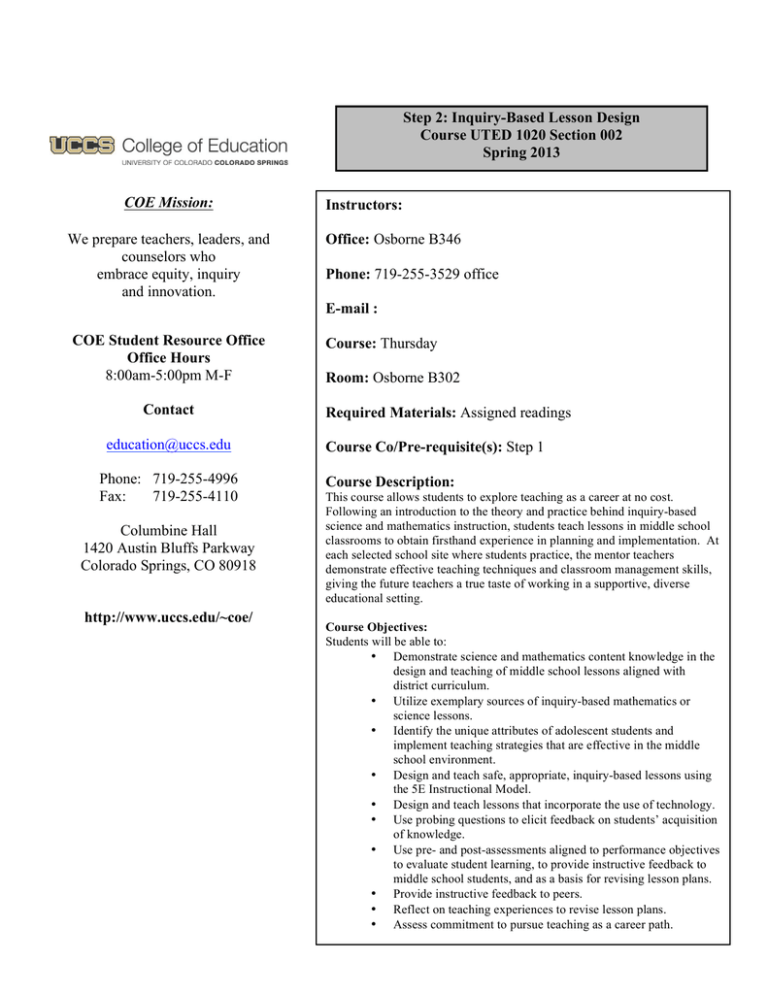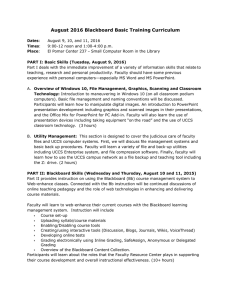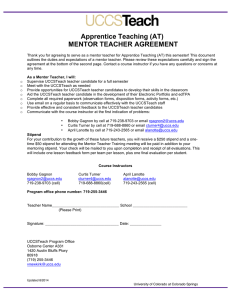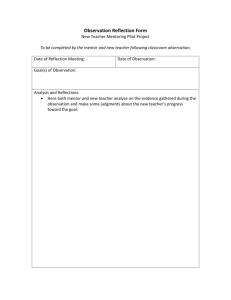Document 10375255
advertisement

Step 2: Inquiry-Based Lesson Design Course UTED 1020 Section 002 Spring 2013 COE Mission: We prepare teachers, leaders, and counselors who embrace equity, inquiry and innovation. Instructors: Office: Osborne B346 Phone: 719-255-3529 office E-mail : COE Student Resource Office Office Hours 8:00am-5:00pm M-F Contact education@uccs.edu Phone: 719-255-4996 Fax: 719-255-4110 Columbine Hall 1420 Austin Bluffs Parkway Colorado Springs, CO 80918 http://www.uccs.edu/~coe/ Course: Thursday Room: Osborne B302 Required Materials: Assigned readings Course Co/Pre-requisite(s): Step 1 Course Description: This course allows students to explore teaching as a career at no cost. Following an introduction to the theory and practice behind inquiry-based science and mathematics instruction, students teach lessons in middle school classrooms to obtain firsthand experience in planning and implementation. At each selected school site where students practice, the mentor teachers demonstrate effective teaching techniques and classroom management skills, giving the future teachers a true taste of working in a supportive, diverse educational setting. Course Objectives: Students will be able to: • Demonstrate science and mathematics content knowledge in the design and teaching of middle school lessons aligned with district curriculum. • Utilize exemplary sources of inquiry-based mathematics or science lessons. • Identify the unique attributes of adolescent students and implement teaching strategies that are effective in the middle school environment. • Design and teach safe, appropriate, inquiry-based lessons using the 5E Instructional Model. • Design and teach lessons that incorporate the use of technology. • Use probing questions to elicit feedback on students’ acquisition of knowledge. • Use pre- and post-assessments aligned to performance objectives to evaluate student learning, to provide instructive feedback to middle school students, and as a basis for revising lesson plans. • Provide instructive feedback to peers. • Reflect on teaching experiences to revise lesson plans. • Assess commitment to pursue teaching as a career path. Course Expectations: (1) Attendance/Participation – This class meets every Wednesday afternoon from 1:40pm-2:55pm. 25% of your grade is based on attendance and active participation in all class sessions. You will lose five points for every absence. Credit for attendance requires arriving on time to each class session, participating in all class activities, and staying until the session ends. If you arrive late or leave early, you will lose 2 points of your attendance grade. Arriving more than 15 minutes late for class will constitute an absence. Attendance is important because in class you will: (a) plan and/or practice your lessons with your partner; (b) get feedback from the instructors and other members of the class regarding your lessons; and (c) observe and learn from demonstration lessons. Because the course meets only once per week and there are no texts, missing class means you miss essential information and experiences. Since you will be working with a partner, the workload for each lesson should be shared equally. (2) Field Experience - You and a teaching partner will teach inquiry-based science/mathematics lessons in a local middle school. Over the course of the semester, you will visit this classroom to conduct at least 1 observation and develop/teach 3 lessons. Early in the semester, pairs will meet their Mentor Teachers to verify the dates of the observations and topics of the lessons. You will send a draft and a revised draft lesson plan as an email attachment to your instructor at UCCS and to your Mentor Teacher at the middle school for approval before you teach the lesson. The first draft of each of your lessons is due to your Mentor and instructor 1 week prior to your teach date. Final lesson plans will be submitted in Blackboard. Your Mentor Teacher will give you feedback via email on UCCSTeach’s “Observation Form Step1/Step2” after each lesson you teach. Your Mentor Teacher will also write a final evaluation of your field experience. If you have a serious emergency and you must miss your scheduled teaching day, notify your partner, your Mentor Teacher, and your instructor as soon as possible. Your partner will teach the lesson alone, and you will be required to make up the missed teaching day. Teaching three lessons is a requirement of Step 2. Regardless of your final average, failure to teach all three required lessons will result in a failing grade for the course. Teaching supplies are available for you to check out for use in your lessons. You are responsible for all items in your care and must return them in a timely fashion. If you need to obtain supplies for a particular lesson, you can request that UCCSTeach instructors purchase them. Materials that have to be ordered require a two week notice, and after you utilize them for your lesson, they will become the property of UCCSTeach. (3) Professionalism in the Field – As representatives of UCCS, UCCSTeach, and as visiting teachers to your local elementary school, we expect you to be professional when participating in your field experiences for this course. You are expected to observe all school district rules, policies, and procedures. Sign in at the front office of the school each day that you visit. You must bring your driver’s license with you. Be sure to wear your name badge that identifies you as a UCCS Teach student. Dress professionally. Each school district has a dress code for teachers and others in field placements. As guest teachers, you are expected to follow all parts of the dress code. Of particular note is the restriction against wearing jeans, flip flops, jewelry in visible pierced areas other than the ear, t-shirts, shorts, or exercise clothing. Arrive at least 30 minutes before your scheduled teaching time; arrive 1 hour before a technology or lab-based lesson to set up and troubleshoot equipment. Practice every aspect of your lesson before you teach it. Decide exactly how you and your partner will share the teaching responsibilities. Make a plan for how you will transition from each part of the lesson to the next. Learn the names of your students! Make nametags or name tents and bring them with you to each lesson. This is an easy and effective classroom management technique. (4) Lesson Plans and Reflections – You will be submitting a total of 4 reflections and 3 lesson plans throughout the semester. Your one observation reflection will be submitted in Blackboard, and your three lesson plans and lesson reflections will be submitted in Blackboard within one week (7 days) after each lesson that is taught or observed. The breakdown of assignments is as follows: Observation Reflection – After the classroom observation of your Mentor Teacher, you will submit an observation reflection (“Observation 1 Reflection”) in Blackboard. You will find this reflection under “Assignments” along with instructions on how to submit in Blackboard. Your reflection must be submitted within one week after you observe. Lesson Plans and Reflections – After you and your partner teach each lesson, you will submit your final lesson plan and lesson reflection (“Step 2 Lesson 1 and Reflection,” etc.) in Blackboard. You will find each of these assignments under “Assignments” along with instructions on how to submit in Blackboard. Each lesson and reflection must be submitted within one week after you teach your lesson. Please use the following naming conventions when submitting your lessons and reflections: Lessons: Last names, Middle school abbrev., Lesson Number Example: BakerSmith_MS_Lesson1 Reflections: Last name, Middle school abbrev.,Reflection Number Example: Baker_MS_Refl1 (5) Late Assignments – If an assignment is submitted late, points will be reduced by 10% for each day late. If more than 5 days late, you will receive a fixed 50% reduction. Technology Competencies: It is expected that students begin our program with foundational technology skills that include digital word processing, digital and online formats (e.g. Blackboard) and using online research databases. Knowledge of the use of technology-supported multimedia, such as PowerPoint and other audio/video resources, is expected. Students who need assistance with building technological skills should speak with their professor to learn about technology resources in the COE and at UCCS. Using your UCCS email account is a requirement of this course due to digital delivery of course content. All students must obtain a UCCS email address and check it regularly (every day) so as not to miss announcements. If your UCCS email address is not your primary one, please have emails from UCCS rerouted to the one you check daily. Attendance, Preparation, and Participation: Students are expected to maintain high standards of ethical and professional conduct. This includes attending class, being adequately prepared, contributing to class discussions, submitting high caliber work and representing your own work fairly and honestly. As an important member of a classroom community, attendance and punctuality is mandatory. You must actively engage in class and group work to maximize your learning in this course. If you must miss a class, please inform the professor by phone or email prior to class. It is the responsibility of the student to obtain course information that is missed during the absence. Unexcused absences will result in a lower grade. Professional Behavior: Professional behavior is necessary for you to be a successful member of a learning community. Please monitor your participation in class discussions and group work and find ways to contribute intelligently to the discussion without silencing others. All written assignments must be computer generated unless otherwise indicated by the professor. Professional behavior will be expected in your future teaching/counseling career and is often the hallmark of career success. Diversity Statement: The faculty of the College of Education is committed to preparing students to recognize, appreciate, and support diversity in all forms – including ethnic, cultural, religious, gender, economic, sexual orientation and ability – while striving to provide fair and equitable treatment and consideration for all. Any student who believes that he/she has not been treated fairly or equitably for any reason should bring it to the attention of the instructor, Department Chair or the Dean of the College of Education. Accommodations: The College of Education wishes to fully include persons with disabilities in this course. In compliance with section 504 and the Americans with Disabilities Act (ADA), UCCS is committed to ensure that “no otherwise qualified individual with a disability … shall, solely by reason of disability, be excluded from participation in, be denied the benefits of, or be subjected to discrimination under any program or activity…” If you are a student with a disability and believe you will need accommodations for this class, it is your responsibility to contact and register with the Disabilities Services Office, and provide them with documentation of your disability, so they can determine what accommodations are appropriate for your situation. To avoid any delay in the receipt of accommodations, you should contact the Disability Services Office as soon as possible. Please note that accommodations are not retroactive and disability accommodations cannot be provided until a “Faculty Accommodation Letter” from the Disability Services office has been given to the professor by the student. Please contact Disability Services for more information about receiving accommodations at Main Hall room 105, 719-255-3354 or dservice@uccs.edu . Military Students: Military students who have the potential to participate in military activities including training and deployment should consult with faculty prior to registration for any course, but no later than the end of the first week of classes. At this time, the student should provide the instructor with a schedule of planned absences, preferably signed by the student's commander, in order to allow the instructor to evaluate and advise the student on the possible impact of the absences. In this course, the instructor will consider absences due to participation in verified military activities to be excused absences, on par with those due to other unavoidable circumstances such as illness. If, however, it appears that military obligations will prevent adequate attendance or performance in the course, the instructor may advise the student to register for the course at another time, when she/he is more likely to be successful. Student Appeals: Students enrolled in programs or courses in the College of Education may access the COE Appeal/Exception Form at: http://www.uccs.edu/Documents/coe/studentresources/AppealsForm2009.pdf. This form is to be used for an appeal when a student is: (1) denied admission to professional education program (2) denied permission to student teach or complete professional internship (3) removed from a professional education program or internship (4) denied permission to graduate due to missing requirements (5) requesting an exception to specific policies, procedures, or requirements (6) requesting a grade change This form is not to be used for requests to take classes out of sequence or to take a class without the proper prerequisites. Such requests should be initiated with the department chair. UCCS Student Code of Conduct: The purpose of the Student Code of Conduct is to maintain the general welfare of the university community. The university strives to make the campus community a place of study, work, and residence where people are treated, and treat one another, with respect and courtesy. http://www.uccs.edu/~oja/student-conduct/student-code-of-conduct.html UCCS Student Rights and Responsibilities: http://www.uccs.edu/orientation/student-rights-and-responsibilities.html UCCS Academic Ethics Code: http://www.uccs.edu/Documents/vcaf/200-019%20StudentAcademic%20Ethics.pdf Assignments/Grading Policy: 100 points (1) Three Lesson Plans (10 points/lesson) – Final lesson plans will be submitted in Blackboard for instructor evaluation within one week after you teach. Regardless of your final average, failure to teach all three required lessons will result in a failing grade for the course. 30 Points (2) Lesson Plan Draft Submission (2 points/lesson) – You must email a first draft of your lesson plan to your assigned instructor AND your Mentor Teacher one week (7 days) or more prior to your teach date. Failure to do so will result in losing points and will impact your teaching. 6 points (3) Attendance/Participation (25 points) – This class meets every Wednesday afternoon from 1:40pm-2:55pm. 25% of your grade is based on attendance and active participation in all class sessions. You will lose five points for every absence. Credit for attendance requires arriving on time to each class session, participating in all class activities, and staying until the session ends. If you arrive late or leave early, you will lose 2 points of your attendance grade. Arriving more than 15 minutes late for class will constitute an absence. 25 points (4) Reflections (4 points/reflection) – total of four, one after the observation visit and one after each lesson taught. Reflections must be submitted within 7 days after the visit. 16 points (5) Student Presentations: Final Activity (14 points) – portions of lesson activities will be presented. 14 points (6) Lesson Approval (3 points/lesson) – Student / Instructor appointment for review and approval. Lesson may not be taught until this is completed. 9 points Grading Scale: A 94-100 B+ 87- 89 C+ 77- 79 D+ 67-69 F 59 and below AB C D 90-93 84- 86 74 – 76 64 – 66 BCD- 80 - 83 70-73 60 - 63 Note: If an assignment is turned in late, points will be reduced by 10% for each day late. If more than 5 days late, you will receive a fixed 50% reduction. Semester Overview and Assignments Class Field Experiences Assignments Overview Become familiar with the course syllabus Mark your calendar for Observations, Lesson Approval Meetings and Teaching Exchange contact information with partner Week 1 Inquiry-Based Teaching 1/24/13 • • • • Introductions Review Step 2 syllabus Assign teaching teams Inquiry-based lesson design • • Week 2 Writing Clear Directions 1/31/13 • Discuss strategies for providing clear directions • Contact Mentor Teacher (in person or by phone) and complete the “Step 2 Assignment: Initial Planning Meeting” by Feb. 1 • Discuss teaching adolescents • • • Select topics for Lesson 1 Review lesson plan format Provide directions for Lesson 1 draft • • • • • • FOSS kits activity Preview evaluation forms used by mentor teacher/instructors Review writing lesson objectives Complete Observation 1 Reflection by Feb. 8 Submit Observation 1 Reflection within 1 week of observation Begin working on Lesson 1 draft Email Lesson 1 draft to instructor and mentor teacher 1 week before you teach Email Lesson 1 draft to instructor and mentor teacher 1 week before you teach Attend Lesson Approval appointment with instructor before teaching Lesson 1 Week 5 Questioning Strategies 2/21/13 • • • Discuss questioning strategies Teach Lesson 1 to another team Organize materials for Lesson 1 • Week 6 Technology and Inquiry; TEACH LESSON 1 2/28/13 • Demonstration Lesson: Use of technology in the classroom Discuss teaching with technology Week 3 Understanding Adolescents 2/7/13 Week 4 Planning Lesson 1 2/14/13 • • • • • • • • • Confirm with your mentor teacher the date/time of your first lesson. Attend Lesson Approval appointment with instructor before teaching Lesson 1 Complete all preparations for Lesson 1 Teach Lesson 1 Submit final Lesson 1 and Lesson 1 Reflection in Blackboard within 1 week after you teach Week 7 Data-Driven Instruction; Planning Lesson 2 3/7/13 • • Week 8 Teaming up Math & Science/Assessment 3/14/13 • Week 9 Differentiation 3/21/13 • • • • • • Reflect on Lesson 1 Discuss analyzing data to inform instruction Select topics for Lesson 2 • Obtain your topic for Lesson 2 and begin lesson plan development Demonstration Lesson: Math & Science connections Discuss the connections between teaching mathematics and science Pre/post assessment discussion Discuss differentiated instruction Teach Lesson 2 to another team Select topic for Lesson 3 • Obtain your topic for Lesson 2 and begin lesson plan development • Email Lesson 2 draft to mentor teacher and instructor 1 week before you teach Attend Lesson Approval appointment with instructor before teaching Lesson 2 Confirm with your mentor the date/time of your second lesson • Week 10 SPRING BREAK – No class 3/28/13 Week 11 Focus on Explanation 4/4/13 • Discuss strategies for facilitating an effective Explanation part of 5E lesson Week 12 Integrated Activities; TEACH LESSON 2 4/11/13 • • Discuss integrated classroom activities Work on Lesson 3 Week 13 Preparing to Teach Lesson 3 4/18/13 • • Teach Lesson 3 to another team Organize materials for Lesson 3 • Prepare 10-15 minute presentation for Final Activity, Presented to class 5/1/13 or 5/8/13 Week 14 Work on Final Activity 4/25/13 Week 15 TEACH LESSON 3; Final Activity Presentations 5/2/13 Week 16 Final Activity Presentations • • Email instructor, if needed, with Lesson 2 modifications for lesson approval • Attend Lesson Approval appointment with instructor before teaching Lesson 2 Confirm with your mentor teacher the date/time of your Lesson 2 Complete all preparations for Lesson 2 Teach Lesson 2 Submit final Lesson 2 and Lesson Reflection in Blackboard within 1 week after you teach • • • • • • • • • • • Final Activity: 10-15 minute presentation for • Final Activity:10-15 minute student presentations • • Email Lesson 3 draft to mentor teacher and instructor 1 week before you teach Attend Lesson Approval appointment with instructor before teaching Lesson 3 Confirm with your mentor teacher the date/time of your Lesson 3. Attend Lesson Approval appointment with instructor before teaching Lesson 3. Complete all preparations for Lesson 3. Prepare 10-15 minute presentation for Final Activity Teach Lesson 3 Submit final Lesson 3 and Lesson Reflection in Blackboard within 1 week after you teach 5/9/13 Standards Covered: Colorado Teacher Quality Standards Quality Standard I: Element a, c-d Quality Standard II: Element a, c-d, f Quality Standard III: Element a, c-h Quality Standard IV: Element a, c Quality Standard V: Element d Quality Standard VI: Element a-b National Council of Teachers of Mathematics Standards addressed in this course: 1.1-1.4, 3.1-3.4, 4.1-4.3, 5.1-5.3, 6.1, 7.1-7.6, 8.1-8.9, 9.2-9.4, 10.5, 16.1, 16.3 National Science Teacher Association Standards addressed in this course: 1a, 1c, 1e, 3a, 3b, 5a–5f, 6a, 8a, 8b, 10b, 10c



